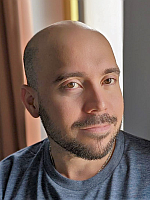You are here :
- EUTOPIA website
- Home
- Research & Innovation
- Fellowship
- SIF - Post-Doctoral Fellowships
SIF 3rd Cohort Fellows - Cristian Jimenez Romero, CY Cergy Paris University

Curriculum Vitae
- Education
2012 – 2016 PhD in the Faculty of Science, Technology, Engineering and Mathematics, The Open University (OU), United Kingdom. Dissertation title: A Heterosynaptic Spiking Neural System for the Development of Autonomous Agents, Supervisor: Prof. Jeff Johnson
2007 – 2011 Bsc Hons Open with emphasis on AI, and neuroscience, OU, UK
1998 – 2001 Technologist in Data systematisation, Faculty of engineering, Univ. Antonio Nariño, Colombia.
1995 – 1997 Qualification as Professional SW. developer, University of the Litoral, Colombia.
- Experience
September 2023 – present: Post-doctoral Fellow, EUTOPIA-SIF (Marie Sklodowska Curie Actions cofund), CY Cergy Paris Université, ETIS (ENSEA Graduate School of Electrical Engineering and CNRS/INS2l).
July 2020 – August 2023: Human Brain Project (HBP) Postdoctoral researcher, Forschungszentrum Jülich, Germany. Research on Neurorobotics and large-scale brain simulations on HPC. SDL-Neuroscience ,Jülich Super Computing Centre (JSC), scientific supervision: Prof. Abigail Morrison
January 2018 – October 2019: Academic assist. (Data Science Pathways to Re-imagine Education), OU, UK.
January 2015 – December 2017: Academic assist. Electronics, Faculty of Design and Engineering, OU, UK.
January 2013 – December: 2014 Scientific developer, EU FP7 ETOILE Project, OU, UK. Prof. Jeff Johnson
July 2005 – August 2012: R&D Software Design Engineer, Nokia Siemens Networks, Germany
January 2002 – May 2005: Telemedicine Software Engineer, Medicom, Germany
May 1998 – March 2001: Software Developer, Organizacion Radial Olimpica, Colombia
- Publications/Research achievements
Research Project:
Hybrid Neural Networks: Combining Artificial and Spiking Neural Networks to Enhance Life-Long Continuous Learning in Autonomous Agents and Robots
Generalised Continual learning in AI, often referred to as lifelong learning, is the capacity to acquire and adapt to new knowledge and experiences over time, even when dealing with multiple diverse tasks. This area of AI presents a persistent challenge. While there has been notable progress in addressing specific issues, AI systems continue to encounter difficulties in applying what they've learned to unfamiliar tasks. As a result, these systems often excel in specific tasks but face difficulties in multi-task scenarios.
This project aims to enhance continuous learning and adaptability of artificial autonomous systems in dynamic environments. It combines artificial neural networks (ANN) and spiking neural networks (SNN) to create hybrid neural networks (HNN). This integration enables the implementation of learning mechanisms in HNN that closely resemble biological systems.
To this end, we will work along two main hypotheses, namely:
(i) In HNN, subnetworks of SNN are able to combine time-dependent information and increase the adaptability and robustness to changes in the environment, while subnetworks of ANN can provide efficient inference of specific stimuli or patterns.
(ii) The combination of global optimization strategies with biologically inspired plasticity mechanisms in SNN will contribute to the self-organisation of the HNN as a system that allows continuous learning while interacting with a dynamic environment.
The project Led by Dr.Jimenez-Romero and supervised by Prof. Th.Manos (Cergy) with co-supervision by Prof. Y.Timofeeva (Warwick) integrates current trends in AI, neuroscience, robotics, and complex systems.


